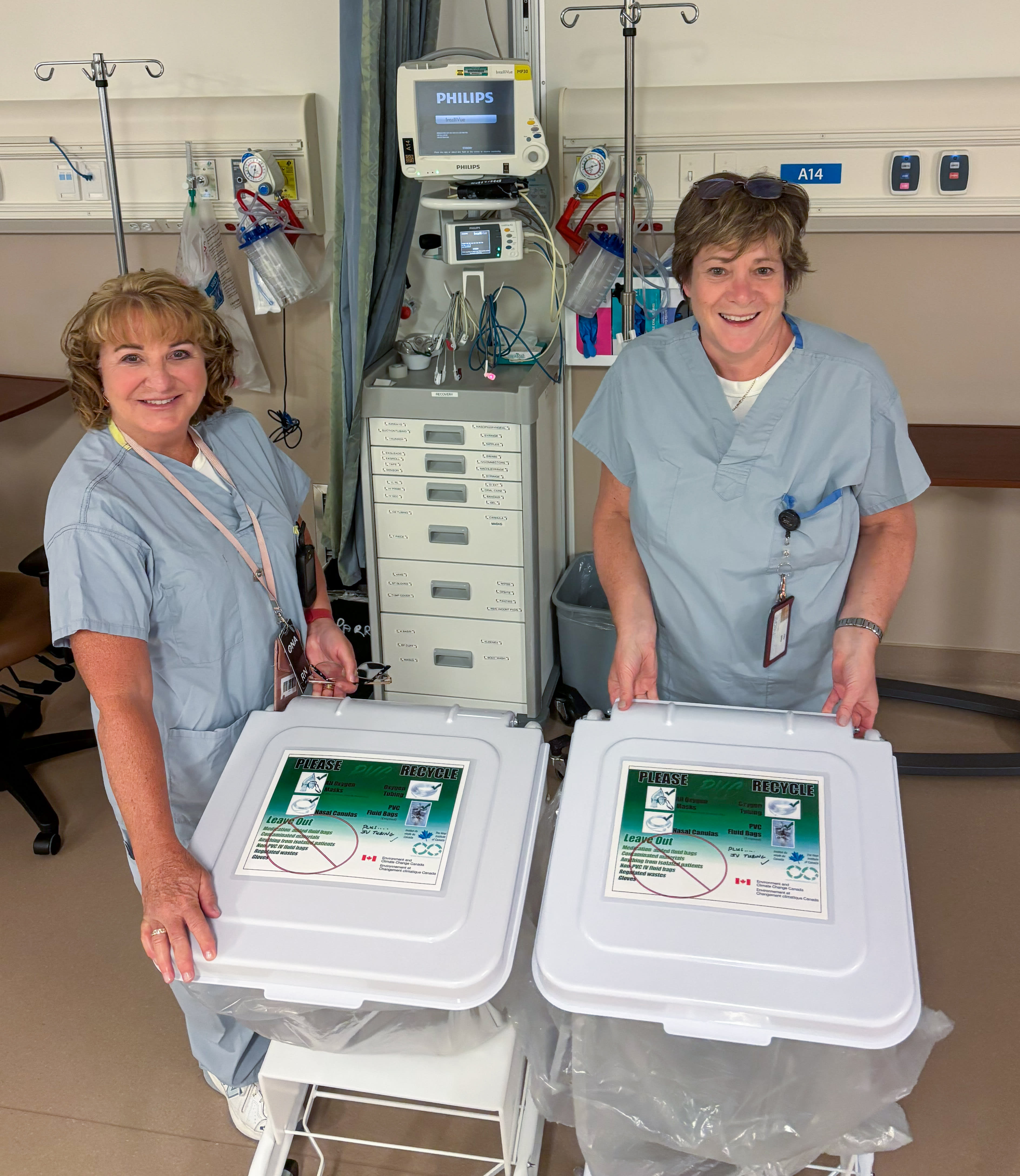
Registered Nurses Donna Mook-McNiven and Gail Harder with recycling receptacles for medical waste. Niagara Health is making concerted efforts to reduce medical waste.
At Niagara Health, we believe that caring for our planet is part of caring for our patients.
This Earth Day, we’re shining a light on how our thoughtful clinical decisions – guided by evidence and best practices – can lead to better outcomes for both patients and the environment.
Our partnership with Choosing Wisely Canada helps bring environmental sustainability to the bedside.
Choosing Wisely is a national campaign that encourages doctors, patients and healthcare teams to avoid unnecessary tests, treatments and procedures. As noted on their website, its initial goal was to “reduce medical overuse but has grown to include recommendations that support environmentally friendly practices.”
“We’re proud to be part of a growing movement in healthcare that champions both patient health and planetary health,” says Dr. Mohammed Refaei, Niagara Health’s lead for Choosing Wisely. “By making smarter, more sustainable clinical choices, we’re not only improving care but also reducing our environmental impact.”
One important area where Niagara Health is making eco-friendly changes is in the operating room (OR). When patients are given anesthesia during surgery, certain gases are used to help them stay asleep and pain free. However, not all anesthetic gases are created equal. Desflurane, for example, is particularly harmful to the environment. It’s about 20 times more damaging than a similar gas called sevoflurane and, when used in the same way, can have up to 50 times the environmental impact.
In alignment with a Choosing Wisely recommendation, Niagara Health made a concerted effort, starting two years ago, to reduce desflurane use. By last year, desflurane use had decreased by 90 per cent, and it has now fully been eliminated at the Marotta Family Hospital. The shift toward lower-impact alternatives, like sevoflurane, intravenous anesthesia, or regional techniques, is helping us reduce emissions while maintaining safe and effective care for patients.
“Through small, evidence-based changes and a shared commitment across teams, we’re making a big impact – one step at a time."
Our perioperative team continues to lead meaningful change. They recently launched the Bring Your Own Reusable Bag initiative in our day surgery and endoscopy programs, encouraging patients to bring reusable bags for their belongings instead of single-use plastic. There are plans to expand the initiative to the inpatient program as well.
Additionally, Niagara Health is taking part in the PVC 123 initiative, which focuses on recycling commonly used medical plastics that would otherwise end up in landfill. For many years, items made from polyvinyl chloride were nearly impossible to recycle, until now.
This year, our ORs, day stay, and recovery rooms began collecting PVC items, such as masks, oxygen tubing and IV bags, to reduce our environmental footprint. We anticipate the program will expand to other units across the hospital in the future.
“Through small, evidence-based changes and a shared commitment across teams, we’re making a big impact – one step at a time,” says Steven Walker, Manager of Clinical Services, Surgical Services.
Sustainability extends beyond the OR. It influences decisions across the entire organization, including how we select and manage medications. When reviewing our hospital formulary – the list of drugs approved for use – we consider not just clinical effectiveness and safety, but also the environmental impact. Wherever possible, we prioritize greener alternatives that support both patient care and the planet.
“As we celebrate Earth Day, it’s important to recognize the vital role healthcare plays in protecting our planet,” says Dr. Wendy Levinson, Professor of Medicine at the University of Toronto and Chair of Choosing Wisely Canada. “Our campaign is committed to reducing unnecessary tests, treatments, and procedures – actions that not only improve patient care but also lessen our environmental footprint.
“By working with more than 20 clinical specialties, we’ve developed climate-conscious recommendations that help phase out low-value practices that harm the environment. Together, we can build a sustainable healthcare system – one that prioritizes both patient health and the health of our planet.”

